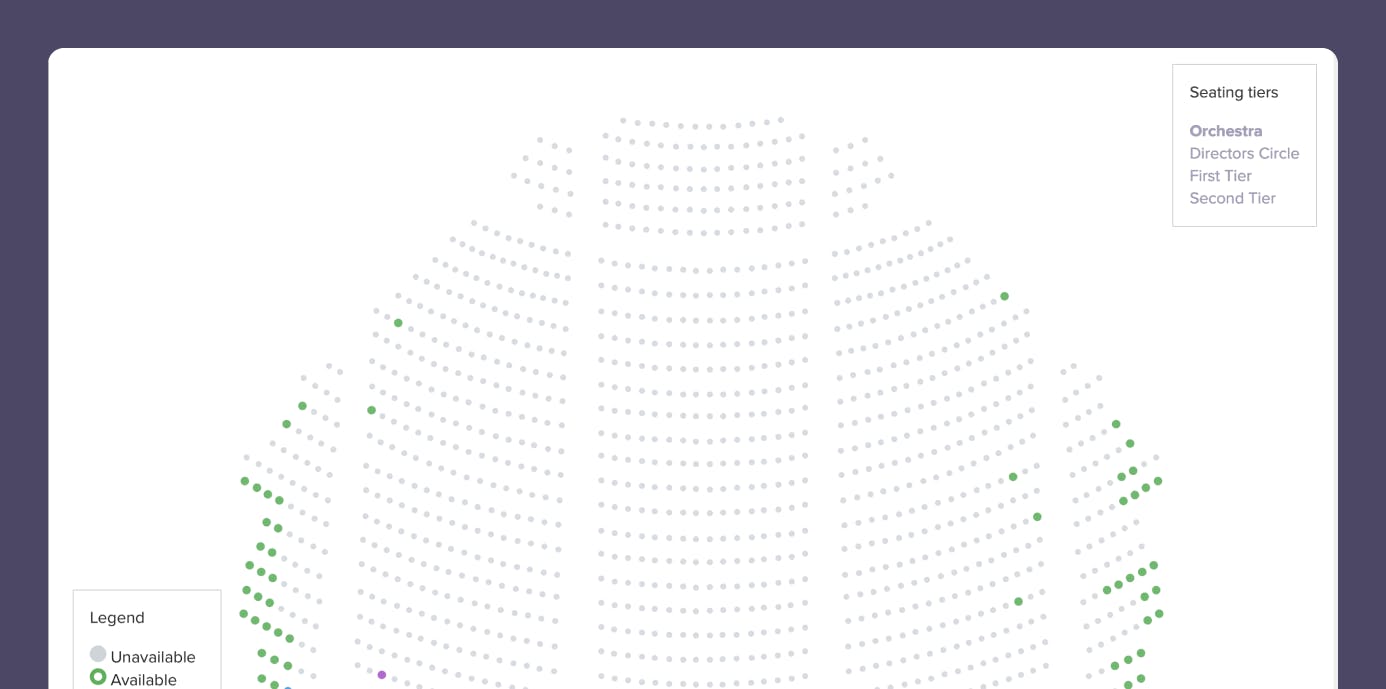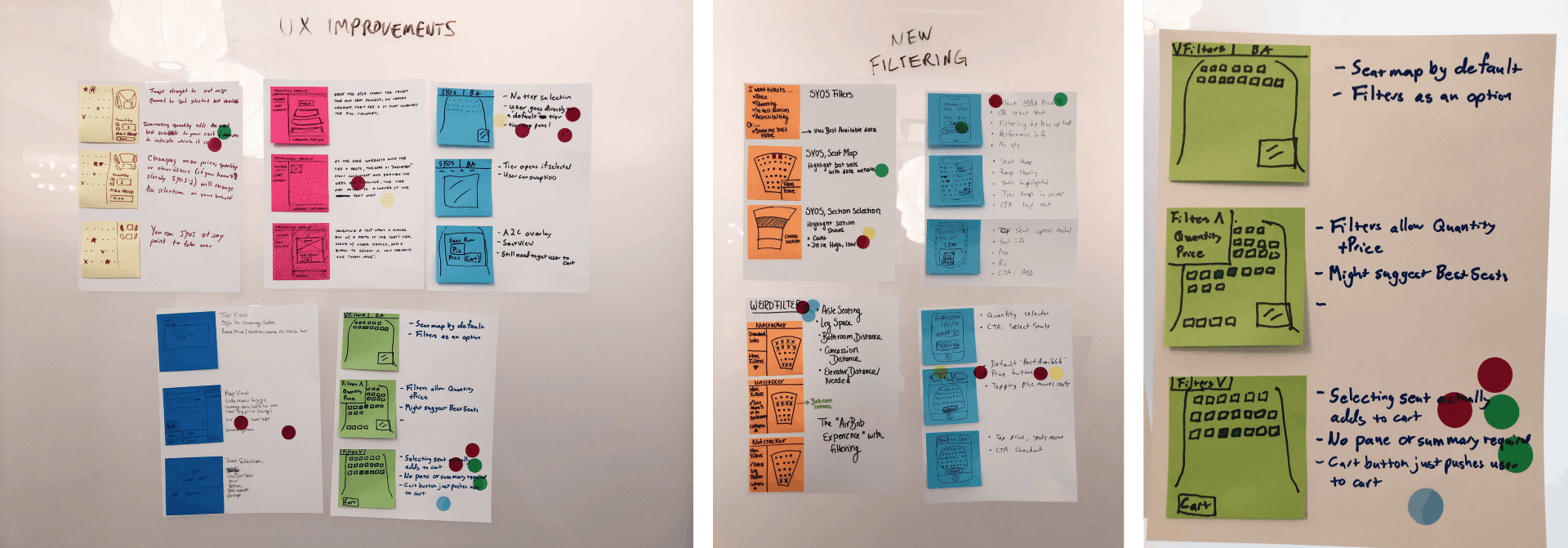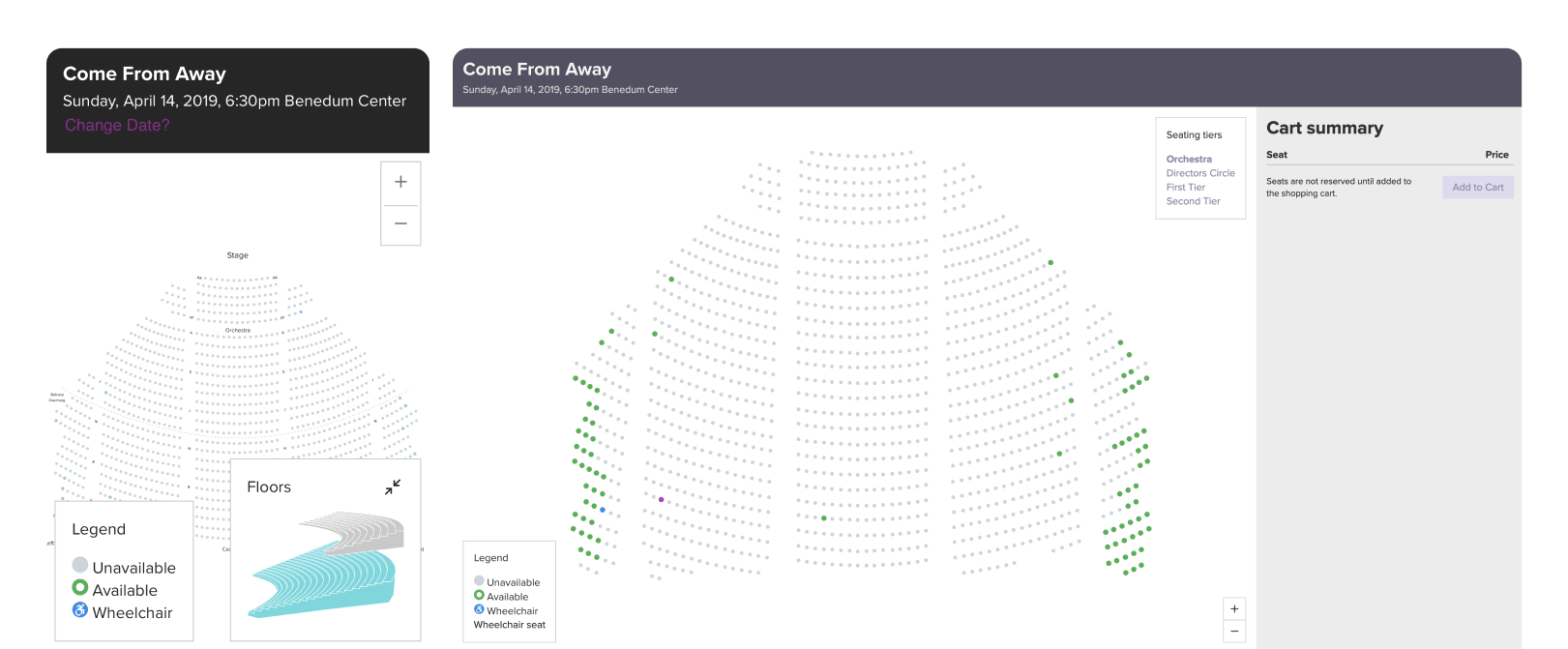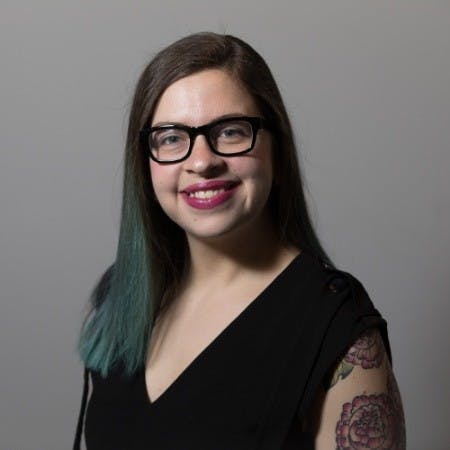Pittsburgh Cultural Trust
Planning for Web Accessibility for Pittsburgh’s Cultural Experiences

Challenge
Refresh a Ruby on Rails seat selection web app

Outcome
Roadmap for a phased rollout of a new app with higher accessibility standards; improved experience on mobile

Who is Pittsburgh Cultural Trust?
The Pittsburgh Cultural Trust (PCT) is a nonprofit arts organization which was formed in 1984 to promote economic and cultural development in Pittsburgh, PA.
The team at PCT manages the 14-block arts and entertainment/residential neighborhood called the Cultural District. This large area of Downtown Pittsburgh includes the theater district with nine separate venues.
The Pittsburgh Cultural Trust has overseen one of Pittsburgh’s most historic transformations: turning a red-light district into a magnet destination for arts lovers, residents, visitors, and business owners. Using the arts as an economic catalyst, PCT has holistically created a world-renowned Cultural District that is revitalizing the area. A major catalytic force in the city, the Pittsburgh Cultural Trust is a unique model of how public-private partnerships can reinvent a city with authenticity, innovation and creativity.
The software development team at PCT manage the technologies which support the cultural and economic revitalization of the Cultural District. This includes PCT’s web presence and ticketing technologies for the entire theatre district of downtown Pittsburgh. The PCT development team works not just to meet expectations for their users by providing online resources, but to find new and innovative ways to serve the population and improve their quality of life.
It’s not typical to find an agency that will not only contribute directly to a Ruby on Rails codebase but will improve the health of the application with each additional pull request. thoughtbot understood that while we are a small team, it is important to us to be continuously introducing new techniques and technologies to our legacy codebase.

Challenge
A key feature of the Pittsburgh Cultural Trust website is the ability for theatergoers to book their own tickets, a feature referred to on the team as Select Your Own Seat.
Their original web app handling bookings in the theater district had been around for about 10 years, and the Select Your Own Seat technology was starting to fall behind. The experience of choosing your own seat was becoming cumbersome on mobile devices, and the team was ready to make a big jump to reach parity between the site’s desktop and mobile experience.
One of the PCT’s engineers was familiar with thoughtbot through their design and development podcasts and written resources on Ruby on Rails. thoughtbot’s combination of design and development skills, as well as familiarity with the toolsets used by PCT, led the Trust to reach out to work together.
Thanks to the thoughtbot team, we were able to improve not only the functionality and design of select your own seat, but the accessibility as well. It was really wonderful to be able to work with developers who had the same passion for that as we do.
Solution
thoughtbot and PCT kicked off the project with a design-oriented week of understanding the existing systems and technologies connecting the Select Your Own Seat web app.
While prioritizing features and functionality for the rebuild, the thoughtbot team saw that accessibility improvements are a high priority for the Pittsburgh Cultural Trust. Theatergoers come from all ages, backgrounds, and abilities. Certain website functionality like the ability to book a theater seat for someone using a wheelchair and their companion already existed in the web app, but there were more opportunities for improvements, such as increased usability for people using screen readers and other assistive technologies.
The thoughtbot team knows that planning for Accessibility takes place from the beginning and throughout a build. Understanding this priority for the PCT team, thoughtbot began to emphasize this as an area for mentorship.
Their first step was to introduce the PCT team to modern automated accessibility testing tools, which helped to catch common accessibility issues during the development process, before they reached production. The team also encouraged consideration of The Web Content Accessibility Guidelines (WCAG) when discussing design and development, and when creating tasks, so that so that they were thinking about accessibility before implementation.
In redesigning the web app, thoughtbot began to mentor PCT’s team on standards-based technology and advised against the use of heavy Javascript frameworks. These informed technology decisions allowed the team to build quickly while laying the foundation for the new web app’s rollout.
The thoughtbot team pair-programmed with PCT’s developers to ensure that the legacy code would be cleaned up, organized, and new code would be built with appropriate tests. Design and development work were carried out to build a seamless, intuitive flow to booking tickets.
As the new web app was developed, thoughtbot and the PCT team conducted usability testing with someone with visual impairment who was using a screen reader in order to increase learnings. Through this testing, the team was able to identify and begin to resolve issues for people using screen readers.

Outcome
The project between PCT and thoughtbot met the project goals and provided enormous benefits for the PCT team going forward.
Using testing tools, doing automated testing, and using browser-based tools, the PCT team became more aware of the variety of resources available to support and plan for building accessible technology, and used the fresh perspective from the thoughtbot team to work faster with their legacy codebase. The results of testing with a vision-impaired user provided value in the new design.
At the end of thoughtbot’s engagement, they worked with PCT on a phased rollout for the new build. In future iterations of the app, not only will the mobile experience for users will be improved, but tickets sold by PCT will be able to be browsed by people using assistive technologies in order to better accommodate visually impaired theatergoers.
The PCT team are now better prepared to incorporate ADA web standards into their website architecture and they will continue working towards improving these standards as they roll out the improved web app over the coming months. Building features with accessibility in mind can result in features which adhere to web standards, which can result in solutions that are easier to understand and more predictable to support. This will enable the PCT team to move more quickly and reduce costs in the future.
By law, our website is required to be ADA compliant. But I think there’s a big leap between being compliant and really being usable in the accessible space. The team at thoughtbot has a real enthusiasm for accessibility and they had a strong impact on our perspective.



